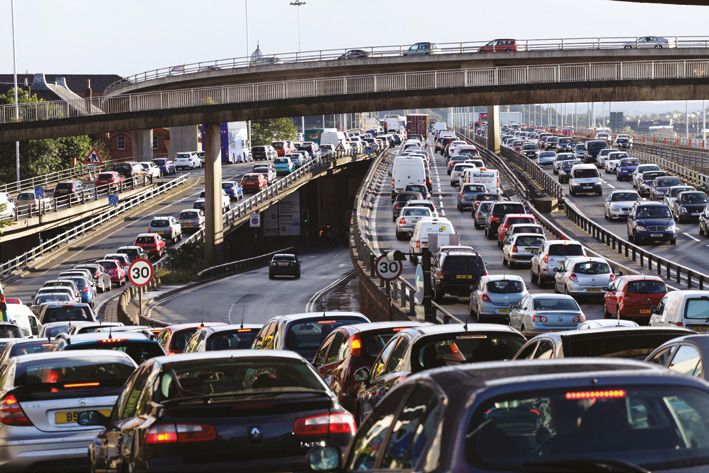Doctors are calling on the Scottish Government to act to reduce preventable ill health caused by air pollution in Scotland to mark World Clean Air Day.
Health Protection Scotland estimate that approximately 1,700 annual premature deaths in Scotland can be attributed to air pollution.
The World Health Organisation has recently recommended that target pollution levels should be much lower than those we have in Scotland.
The Royal College of Physicians of Edinburgh (RCPE), The Royal College of General Practitioners (RCGP) in Scotland and The Royal College of Paediatrics and Child Health (RCPCH) in Scotland want the Scottish Government to focus on reducing yearly average levels of nitrogen dioxide (NO2), a toxic gas produced mainly from transport, from 40µg/m³ to 20 µg/m³ over the next five years with the ultimate aim of achieving the World Health Organisation (WHO) recommended 10µg/m³ by 2035.
They also want the Scottish Government to focus on reducing peak levels of traffic-related air pollution, that occur during busy periods such as rush hour.
Rush hour is often when a large number of our population, including children on school journeys, are normally more exposed to polluted air.
Air pollution is linked to premature birth, smaller infants with decreased brain growth, children’s hospital admissions with lung and skin disease, and significant adult ill health such as heart attacks, dementia, stroke and lung disease.
Professor Jill Belch, Co-Chair of The Royal College of Physicians of Edinburgh’s short-life working group on air pollution, said: “The Royal College of Physicians of Edinburgh has consistently called for urgent action on air pollution. Clean Air Day is the perfect time to remind political leaders that there’s much more to do in reducing the preventable ill health caused by air pollution.
 GCC
GCC“We recently proposed to the Scottish Government a pilot scheme to place air quality monitors near a number of urban primary schools in our largest cities. By doing so, we can collect better data on air pollution “hotspots” near schools, which could make Scotland better informed to create policies to reduce child ill health linked to air pollution.”
Professor Andrew Elder, President, The Royal College of Physicians of Edinburgh said: “Prevention of illness and disease must be central to the Scottish Government’s plans for public health. Air pollution must be a continued focus of preventative efforts – particularly to avoid exposing children to harmful air in the early stages of their lives. We ask all politicians in Scotland to take this matter seriously – and meet the levels recommended by the World Health Organization.”
Dr Mairi Stark, Scottish Officer, The Royal College of Paediatrics and Child Health said: “As paediatricians, we see first-hand the detrimental impact air pollution has on children. Children are particularly vulnerable to air pollution, as they breathe faster and inhale more airborne toxicants in proportion to their weight, than adults exposed to the same air pollution.
“This can have a lasting impact on their health and development. Studies show that children and young people in deprived communities also bear the greatest burden of air pollution, exacerbating already rampant health inequalities.
“The Scottish Government must act to address this and prevent further widening of child health disparities. Urgent action is required to meet WHO recommendations and ensure children in Scotland grow up in a healthy environment. RCPCH calls on the Scottish Government to make child health a focal point in all climate change policies and prioritise reducing air pollution.”
Dr Munro Stewart, Joint clinician representative for Climate and Sustainability at RCGP Scotland said: “There is much to be gained from action on improving air quality. Air pollution impacts all the organs in our body and contributes to Scotland’s poor record of health inequity.
“The Scottish Government should take action and commit to this yearly average target for nitrogen dioxide, alongside a holistic approach to this multi-factorial challenge, as this will deliver healthier communities and reduce demand on an overstretched NHS.”
A Scottish Government spokesperson said: “Scotland enjoys good air quality compared with much of Europe, but we are not complacent and determined to go further.
“Our work to deliver our 2021 strategy, Clean Air for Scotland 2, including the introduction of Low Emission Zones in our four largest cities, means that Scotland has met all of its air quality objectives for the second consecutive year.
“In addition, the Scottish Government is considering the implications for future policy following the publication of the updated WHO air quality guidelines.”
Follow STV News on WhatsApp
Scan the QR code on your mobile device for all the latest news from around the country


 iStock
iStock

























